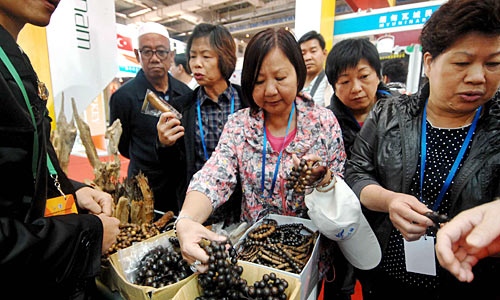 |
|
TONS TO TRADE: The 2010 China (Ningxia) International Investment and Trade Fair opens on September 26 in Yinchuan, capital of NingxiaHui Autonomous Region. More than 254 foreign companies from 66 countries and regions brought their products (PENG ZHAOZHI) |
Numbers of the Week
828.6billion
China's software industry posted revenues of 828.6 billion yuan ($123.7 billion) in the first eight months of 2010, soaring 29.8 percent from one year earlier, said the Ministry of Industry and Information Technology.
1.01trillion
The country's insurance industry collected 1.01 trillion yuan ($151 billion) in insurance premiums in the first eight months of 2010, up 33 percent year on year, said the China Insurance Regulatory Commission.
TO THE POINT: China's manufacturing sector warms up as indicated by an increase in the Purchasing Managers Index (PMI). The catering and retail sectors gain momentum each year during the National Day holiday (October 1-7). China allows interbank loan transfers, giving the lenders greater flexibility to manage their credit assets. Gold producer China National Gold Group Corp. fares well amid a prolonged gold market boom. Cotton prices skyrocket, casting an ominous shadow over prospects for the textile industry. The growth rate for China's industrial profits slows, as government emission reduction measures take effect. The e-reader maker Hanvon makes forays into the Taiwan market.
By HU YUE
PMI Increase
The Purchasing Managers Index (PMI), an effective gauge of the manufacturing sector, came in at 53.8 percent in September, up 2.1 percentage points from August, said the China Federation of Logistics and Purchasing. Nine of the 11 sub-indexes, including production and new orders, increased in September compared with August.
The September index reading was the highest since May and marked the 19th consecutive month that the index was above 50 percent. A reading above 50 percent indicates economic expansion, while below 50 percent indicates contraction.
"The September index shows the slowdown in China's economic growth has stabilized," said Zhang Liqun, a researcher with the Development Research Center of the State Council.
Holiday Prosperity
For China's service industry, the National Day holiday (October 1-7) is always a powerful perk.
During the seven-day holiday, retail and catering sales totaled 592.5 billion yuan ($88.3 billion), representing a surge of 18.7 percent year on year, said the Ministry of Commerce.
The tourism industry prospered as well. Beijing, for example, received 9.3 million domestic tourists, 13.7 percent higher than the holiday last year, said the Beijing Tourism Administration. Its tourism revenues totaled around 6 billion yuan ($895.52 million), up 21.7 percent from one year ago.
Interbank Lending
China's banks are now allowed to sell loans to each other, marking a significant stride toward a market-driven financial system.
At a ceremony on September 25 in Shanghai, 21 banks, including the Industrial and Commercial Bank of China Ltd. (ICBC), Agricultural Bank of China Ltd. and Bank of Communications Ltd. (BOCOM), joined the interbank transfer system.
The first deals were also announced, including one in which BOCOM sold 40 million yuan ($6 million) in loans to ICBC's Shanghai branch.
The transfer system will liberalize interest rates, help lenders optimize their credit structure and keep a handle over market risks, said Zhou Xiaochuan, Governor of the People's Bank of China, the central bank.
It will also help the central bank supervise the banking system and control the macro-economy, he said.
As part of the country's stimulus program, Chinese banks lent 9.6 trillion yuan ($1.4 trillion) in 2009. Despite a much slower lending pace this year, some lenders are still struggling to meet the regulatory requirement of a loan-to-deposit ratio of 75 percent.
With the chances to transfer loans off their balance sheets, it should be easier for banks to comply with the rules, said Zhou Shanshan, a senior analyst at BOCOM International Holdings Co. Ltd.
Good as Gold
The China National Gold Group Corp., the country's top gold producer, is basking in the glow of a significant market boom.
The company said its profits amounted to 2.4 billion yuan ($358.2 million) as of September 20, four times the amount at the end of 2006. Sales revenue totaled 38.2 billion yuan ($5.7 billion), 4.5 times that of the end of 2006.
The group controls 30 percent China's gold reserve and accounts for more than 20 percent of national output.
Risk-aversion took hold as investors scoop up the precious metal on worries about uncertainties hanging over the economy, such as inflation, said Wang Lixin, General Manager of the World Gold Council (WGC) in China.
The Chinese gold market is bound for prosperity with demand burning hot, he said.
Prices of gold futures at the Shanghai Gold Exchange have gained more than 18 percent so far this year.
| 